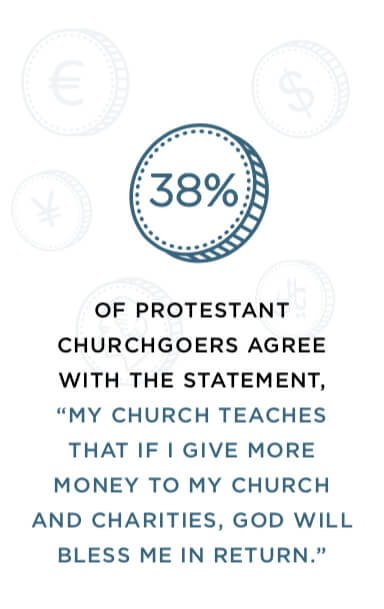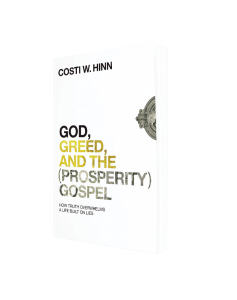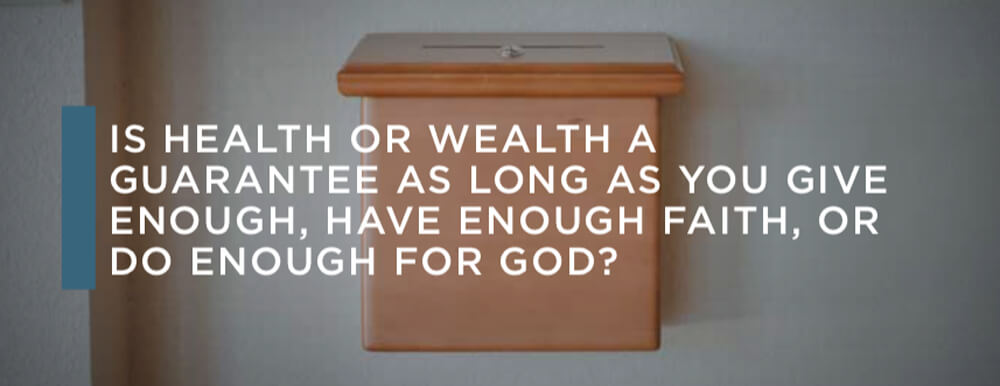Last July Haven Today aired a new series on the prosperity gospel with Costi Hinn, the nephew of a famous televangelist prosperity preacher.
It turns out it struck a nerve.
What I thought would be interesting—and maybe controversial—became Haven’s most listened-to program of the year. This simply doesn’t happen during the summer months when our listenership is lower than normal.
Not only that, but Costi’s parents were listening, too, and the Lord moved in their hearts. After hearing their son’s interview, they committed to reevaluating their lifestyles and teaching.
Why did this one-week radio series capture so much attention?
I think it’s because the prosperity gospel is more prevalent than we like to think in the church today. If we’re not careful, we might even find ourselves agreeing with some of its basic tenants. In fact, LifeWay Research found 38% of Protestant churchgoers agree with the statement, “My church teaches that if I give more money to my church and charities, God will bless me in return.”
On the surface this sounds perfectly logical. But is that really what the Bible teaches? Is health or wealth a guarantee as long as you give enough, have enough faith, or do enough for God?
The answer is very personal for me. When I was five or six years old in the 1950s, my birth mother suffered frequent asthmatic attacks. With little medical help to be had back then, she died a couple of years later from a heart attack brought on by asthma. My, how we prayed.
Our church-going family prayed for my mother to be healed. People at church joined us in prayer. I’ll never forget one Sunday afternoon as my mother watched a preacher promise healing— you just had to lay your hands on the TV, muster up enough faith, and then send in an offering. My mother struggled to get up. She placed her hands on our new black and white TV. I can’t remember if she sent a gift, but I know for sure she wasn’t healed.
There are countless other stories like this. Vulnerable people who are desperate for healing, and preachers who say if you simply have enough faith (and often enough money) God will reward you with what you want.
When people attend crusades or lay their hands on the TV, most aren’t hoping for Bentleys, though some of them do. They are usually people who pick themselves up out of hospital beds, roll down the aisle with wheelchairs, or face chronic pain day in and day out.
 The problem is, they’re being fed a lie. Prosperity theology is built on a certain way of reading Scripture. Often referred to as “biblical principles” or “principles of the kingdom,” this systematic approach ultimately leads to the conclusion that becoming a person of integrity will lead you to health and wealth.
The problem is, they’re being fed a lie. Prosperity theology is built on a certain way of reading Scripture. Often referred to as “biblical principles” or “principles of the kingdom,” this systematic approach ultimately leads to the conclusion that becoming a person of integrity will lead you to health and wealth.
It doesn’t take long to break this chain of logic when we look more closely at Scripture. Let’s consider the prophet Jeremiah, who preached the gospel to Israel faithfully throughout his life only to be thrown into a pit and almost killed for his integrity. Job is another famous example. But if there ever was a human being more faithful, who did not receive health and wealth, it was Jesus. He never sinned. He always did what his Father wanted. Yet, as he says in the book of Matthew, he had nowhere to lay his head. He was poor. All of this wasn’t so we could become materially wealthy, but so that in him, in his life, in his death, in his resurrection, we could find an eternal inheritance.
The true biblical principles are faith alone, grace alone, in Christ alone. It’s in Jesus that we have true prosperity, one that is stored in heaven, where moth and rust can’t destroy. It’s our heavenly inheritance, and one day we’ll receive it in the new creation.
ABOUT THE AUTHOR
As the leader of the Haven Ministries, Charles Morris is always thinking of ways to lead Christians and non-Christians to Christ—hence the familiar slogan, “Telling the great story … it’s all about Jesus.” A former secular journalist, Charles has worked for United Press International, and as a press secretary for two former U.S. senators. He and his wife, Janet, have authored several books, including Missing Jesus. Charles’ latest book is Fleeing ISIS, Finding Jesus: The Real Story of God At Work.
 American Gospel: Christ Alone (DVD)
American Gospel: Christ Alone (DVD)
- “The great strength of the film is that it’s not only a negative examination of the Word of Faith movement, but also a very positive and helpful examination of biblical truth. ” – Tim Challies
- “This is the best clarifying juxtaposition of truth and prosperity preaching I know of. I pray millions of people around the world will watch this for the glory of Christ and his Good News.” – John Piper
- “I think suffering Christians will discover an unexpected balm in this film as they are reminded of the true hope provided in Christ Jesus.” – Reagan Rose
 God, Greed, and the (Prosperity) Gospel
God, Greed, and the (Prosperity) Gospel
Through a remarkable and fascinating journey, Costi Hinn went from a next-generation prosperity preacher to the first to abandon the family faith and share the true gospel. Nephew of the world-famous televangelist, Benny Hinn, Costi had a front-row seat to the inner workings and theology of the prosperity gospel. But as Costi’s faith deepened, so did his questions about prosperity teaching. As the deceptions in his past were exposed, Costi came face to face with the hypocrisy and devastation caused by his belief system, and the overwhelming truth about the real Jesus Christ.


